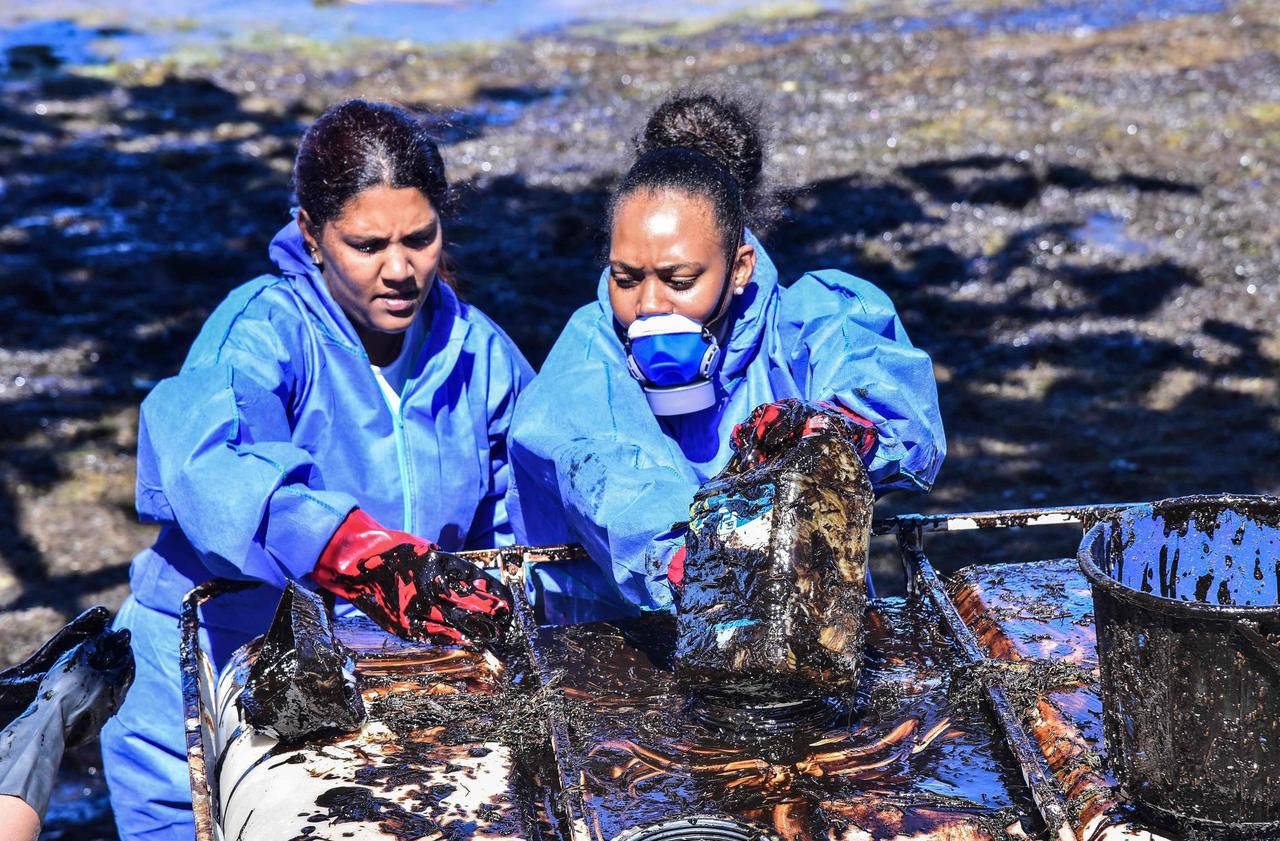Since she launched the call to collect hair, supposed to absorb the fuel in the water, Julie de Rosnay has received daily phone calls. “People ask me if I still need hair. I answer: yes, yes, we will still need it for many months to come. "
After the sinking of the bulk carrier Wakashio in the south-east of Mauritius on July 25, the Mauritian volunteers scrambled to avoid an environmental disaster. On Friday August 9, the government decided to intervene and the pumping of heavy oil is progressing well. But there are around 400 tonnes of diesel left in Mauritian waters, according to local NGO Eco Sud. The inhabitants of the island therefore remain mobilized, against the advice of the authorities.
Hands in fuel
"Since the government has woken up, the watchword has been: for your health, do not touch the fuel oil", says Sébastien Sauvage, spokesperson for Eco Sud. The NGO even printed the message on posters for volunteers. But sometimes the need to help is too strong.
"When you make a living from fishing or tourism and you see your mangrove forest covered with oil, it's very difficult to stand idly by," confirms Mélissa Le Clézio, who manages the coordination of teams of volunteers in Mauritius. .
Equipped with boots, gloves and coveralls, the Mauritians continue to extract heavy fuel oil from the water using shovels. They do not hesitate to go to sea to recover toxic materials and store them in barrels. “Fishermen lent us their boats,” says Laila R., a very committed volunteer.
Residents who had descended into the oil slick complained of asthma, burning eyes and irritation. "To help them, volunteer doctors came to the beaches," reveals the young woman. “We asked for the fuel data sheet five days ago to find out the risks involved, but we still haven't received it,” laments Sébastien Sauvage from Eco Sud.
But between the physical pain and the sadness of seeing their natural heritage destroyed, many prefer to continue. "We decided that the volunteers should now be over 18 years old to participate, says Laila R. And we protect ourselves as much as possible with gloves, boots ..."
Newsletter My Earth
Every week, the environmental news seen by Le ParisienI'm registering
Your email address is collected by Le Parisien to enable you to receive our news and commercial offers. Learn more
Mistrust of the government, accused of having reacted too late, does not help matters. "They say they have removed all the oil from the boat but people are wondering if this is true because we have no proof," asks the volunteer.
Since August 7, authorities have closed access to the area where the wreck of the Wakashio is located, as well as the beaches in the south of the island, where Laila and her friends gather. “They have become restricted areas, the police have the right to use force to dislodge us, but we continue without really knowing whether they will do it or not,” she continues.
Hair sausages
The mobilization of all is however essential. And some Mauritians have found how to help without putting themselves in danger. They make large sausages filled with straw in order to absorb and contain the fuel in the sea. “Luckily, in Mauritius we are currently in the middle of the sugar cane cutting period. So we were able to harvest tons of straw for our buoys, ”says Mélissa Le Clézio, who lives in the north of the island and who has created a workshop near a sugar factory.
The young woman marvels at the generosity and solidarity that reigns on the island. “In 33 years in Mauritius, this is the first time that we have mobilized on this scale. In the workshop, the inhabitants sew, collect straw, nylon thread, adhesive tape, and transport the sausages to the beaches.
When they run out of straw, the Mauritians fill the sausages with ... hair and hair. “People go around the island's hairdressing salons to pick them up,” explains Mélissa Le Clézio. "Hairdressers even came to cut the volunteers' hair directly on the beaches," adds Laila R.
Oil spill on Mauritius: "We make buoys with the hair and feathers of guinea fowl"
For now, their efforts have already made it possible to collect a ton of hair, which they are in the process of putting in the water. And it is pouring in from many countries. “I just got a phone call from South Africa which has 50 tonnes to give us,” says Julie de Rosnay, who manages the collection. Luckily, a South African citizens' movement found a gigantic stock of unused hair in a shed. “They were supposed to be used to make fertilizer at the base,” she explains.
In France, a veterinary clinic in Maraussan, near Béziers (Hérault), even donated hair from animals shorn on site. But the volunteers still haven't got the green light from the government to import these odd cargoes.
Despite the obstacles, the Mauritians remain hopeful. “We must keep this mobilization at all costs,” insists Sébastien Sauvage. There is still a lot of work to clean up the mangroves, islands and underwater fauna. “I think it would make more sense for the local community to receive training in cleaning and work, rather than using private companies,” he insists.
In addition to its environmental impact, the oil spill risks causing great financial distress among Mauritian fishermen and tourism professionals. And the latter have already been greatly affected by the slowdown in air links linked to the Covid-19 crisis.

